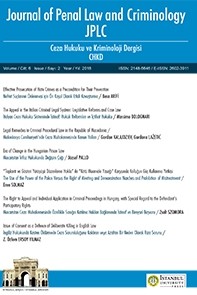Suç Delillerini Yok Etme, Gizleme veya Değiştirme Suçu
Türk Ceza Kanunu md. 281’de düzenlenmiş olan suç delillerini yok etme, gizleme veya değiştirme suçu, adliyeye karşı işlenen suçlardandır. Md. 281’deki suçun konusunu, daha önceden işlenmiş olan bir suçun delilleri oluşturmaktadır. Bu nedenle daha önceden işlenmiş olan bir öncül suçun bulunması gerekmektedir. Bu suç, bir suçun delillerinin yok edilmesi, silinmesi, gizlenmesi, değiştirilmesi veya bozulması şeklinde seçimlik hareketlerle işlenebilmektedir. Söz konusu seçimlik hareketlerden birisinin işlenmesiyle suç tamamlanmış olmaktadır. Öncül suçun kasten veya taksirle işlenmesi gerekir; ancak delilleri yok etme suçu doğrudan kastla işlenebilir. Çünkü fail, md. 281’de sayılan hareketleri gerçeğin ortaya çıkmasını engellemek amacıyla işlemelidir. Bu nedenle olası kast yeterli değildir. Ancak suçun oluşabilmesi için failin gerçeğin ortaya çıkmasını engellemek amacıyla hareket etmesi yeterli olup, amacına ulaşmış olması gerekli değildir. Bu suçla ilgili olarak md. 281/3’te bir etkin pişmanlık hükmüne yer verilmiştir. Buna göre fail, suç nedeniyle hüküm verilmeden önce gizlenen delilleri mahkemeye teslim ederse hükmedilecek cezada indirim yapılacaktır. Bu düzenleme yanlış anlama ve uygulamalara yolaçacak niteliktedir. Bu nedenle etkin pişmanlıktan yararlanmak için delillerin mahkemeye teslimi şartı yerine, delillerin adli merciler tarafından elde edilmesini sağlamanın yeterli olacağı bir düzenleme yapılmalıdır.
The Offence of the Suppression, Obfuscation and Alteration of the Criminal Evidences
The offense of destruction, concealment or alteration of the evidence, which isa criminal offense regulated underArticle 281 of the Turkish Criminal Code, is an offense against the administration of justice. The subject of this offence regulated under Article 281 is the evidence of a criminal offense which has been already committed. For this reason, for this particular offense to be committed, an already committed offence must be present. This offensecan be committed by five different acts such as destruction, deletion, concealment, alteration or corruption of an evidence. The crime is completed by concluding one of these acts. Thus, the crime can be committed via five different acts. The predicate offense can be committed deliberately or by negligence however, the offense of destruction, concealment or alteration of the evidence must be committed deliberately. The perpetrator should also commit the acts listed under article 281 of the Turkish Penal Code with the aim of concealing the truth. There is no need for the perpetrator to succeed in concealing the evidence for this offence to be committed, only a certain intent to do so may suffice. Article 281 subclause 3 of the Turkish Penal Code providesan effective remorse clause. Accordingly, the penalty is reduced if the perpetrator submits the hidden evidence to the court before the judgment is delivered. This provision is likely to lead misunderstandings and wrongpractices. For this reason, the law should be amended as follows: making sure the evidenceis obtained by judicial authorities should be sufficient to invoke the effective remorse clause rather than requiring the perpetrator to submit the evidence to the judicial authorities personally.
___
- EVİK, Vesile Sonay, Suçluyu Kayırma Suçu (Straftat der
Begünstigung), Galatasaray Üniversitesi Hukuk Fakültesi Dergisi
(Zeitschrift der Juristischen Fakültät der Galatasaray Universität),
Prof. Dr. Köksal Bayraktar’a Armağan (Festschrift für Prof. Dr.
Köksal Bayraktar), Band I, S. 717‐747, Istanbul 2010.
- İSFEN, Sabit Osman, Das Schuldprinzip im Strafrecht, unter
besonderer Berücksichtigung des türkischen Rechts, München 2008.
- KREY, Volker, Strafrecht Besonderer Teil, Band 1, Besonderer
Teil ohne Vermögensdelikte, 6. Auflage, Stuttgart 1986.
- KOCA, Mahmut/ÜZÜLMEZ, İlhan, Türk Ceza Hukuku Özel
Hükümler (Das Türkische Strafrecht Besonderer Teil) , 2. Auflage,
Ankara 2015.
- KOCA, Mahmut/ÜZÜLMEZ, İlhan, Türk Ceza Hukuku Genel
Hükümler (Das Türkische Strafrecht Allgemeiner Teil) , 6. Auflage,
Ankara 2013.
